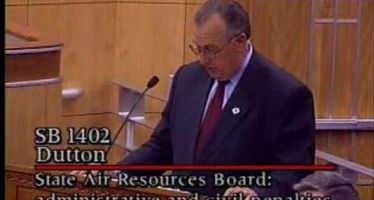Insurance Czar-elect Targets ER Bills
NOV. 9, 2010
By KATY GRIMES
Emergency room physicians used to receive timely payments for services from insurance companies. Then managed care was ushered in and they’ve been fighting for payment ever since.
The Subcommittee on Health and Human Services held a hearing Monday to address the many complaints received from doctors to the Department of Managed Care about underpayments from HMOs.
According to Committee Chairman Assemblyman Dave Jones, D-Sacramento, representatives from the Department of Managed Care refused to attend the hearing, and apparently because of a directive by the governor’s office. “I am very disappointed to hear that no one was willing to attend the hearing,” said Jones. “This is deeply distressing.”
Jones, the newly elected state insurance commissioner won’t take office until January, but made clear at the hearing that this issue is important to him.
The issues were to be presented to the committee by two panels – one by the managed care department, and the other made up of emergency physicians.
Dr. Andrea Brault, president of the California Chapter of the American College of Emergency Physicians, pointed to the vulnerability of the emergency medicine safety net. “California is ranked fifty-first in the nation in access to emergency care,” said Brault. “Waiting for hours for emergency care, no surge capacity, with no flu epidemic capacity,” were just a few of the issues plaguing the quality of emergency medical care in the state. Brant explained that emergency physicians are charged with taking care of everyone who seeks emergency care, and said that there are studies proving that California emergency rooms are not overrun by patients with non-emergency medical problems. “The people who come to us are sick or in pain, and not frivolous cases.”
AB1455 was supposed to remedy unfair payment practices, according to Brault, but has not been enforced. The bill, sponsored by the California Medical Association, applies to the Knox-Keene licensed health care plans regulated by the Department of Managed Health Care, including their contracting claims processing organizations, medical groups, and Independent Practice Associations (physician networks) with delegated claims adjudication responsibilities. The Knox-Keene Health Care Service Plan Act of 1975 regulates all California HMOs, as well as Blue Cross and Blue Shield PPOs.
A lack of enforcement has meant “longer waits in emergency rooms, and when the number of patients exceeds capacity, the ER closes to ambulances. Doctors become overwhelmed, and at some point, stop taking cases,” explained Brault. “We see patients and hope somebody pays us.”
Brault said that the source of the problem is the Department of Managed Care, which does not enforce the law, and is instead friendly with those it should be regulating.
Brault said doctors have filed hundreds of thousands of complaints with the managed care department, and instead of receiving resolution, the department required stifling restrictions of claims the process, limiting doctors to only 50 claims at one time, often with only one of the 49 claims getting paid. The department had unusual timeline requirements that further prevented emergency doctors from getting payment for services.
Attorney Andy Selesnick, testified that he represents emergency care doctors, and gave an overview of what’s wrong with the process, from the doctor’s viewpoint.
He described what occurred with La Vida, a large Southern California company responsible for paying emergency room doctors. La Vida contracted with hundreds of health plans to provide “lives,” and were responsible for paying for the care of the patient. Selesnick said, “By 2007, La Vida had failed to meet several solvency issues.” They had a history of not maintaining sufficient capital to operate, consequently leaving most of the emergency room physicians that were owed money by La Vida patients, unpaid.
Selesnick said that it took the state’s managed care department more than one year of unpaid doctor’s claims to address La Vida’s solvency issue. But said Selesnick, “The department gave La Vida more than three years to get out of trouble, meaning three more years of unpaid claims.”
La Vida eventually closed, but because the managed care department had not made public La Vida’s history of unfair payment patterns, it was more than one year later before closure, and millions of dollars in additional unpaid claims.
La Vida is just one such company in the state that is responsible for paying doctors, but either underpays their bills, or does not pay them at all according to Brault and Selesnick.
Tim Madden testified on behalf of Dr. David Strumpf, an emergency physician in the Santa Barbara area, that Strumpf regularly has bills underpaid because the companies paying the medical bills of patients re-classify the service or downgrade it, in order to pay less. Strumpf has filed complaints to the managed care department, and sent hundreds of emails, 90 percent of which went unanswered.
The doctors said they just want fair payment for emergency services, and want the managed care department to enforce the laws.
Dr. Brault presented solutions, which include:
- Requiring the state’s managed care department to enforce AB1455 violations in a timely manner, and use meaningful fines to discourage inappropriate payment practices;
- Establish ‘reasonable value’ standards;
- Use unbiased, non-conflicted adjudicators and claims coding experts;
- Require paying groups and medical foundations to abide by AB1455 regulations and meet Know-Keene capital requirements.
Jones suggested introducing legislation to address the problem, and asked if the managed care department doesn’t already have the authority to enforce AB1455.
Jones again expressed his dismay that the managed care department officials chose not to attend the hearing. The managed care department representatives are Schwarzenegger appointees and practically out the door as of last Tuesday’s election. Had the hearing been held six months ago, the managed care department’s appointees and officials would have appeared and the process of accountability could have begun in a more meaningful way.
Many in the current Legislature are also on the way out, and newly elected Assembly members and senators will be coming in, but not until January – at which time Jones also begins his new role as insurance commissioner. And the new governor will appoint new officials to run the Department of Managed Care.
Perhaps this hearing was a precursor to Jones’ new job. “This is very troubling, and not sustainable,” he said.
Related Articles
Trump candidacy complicates CA Senate race
Donald Trump has complicated the already difficult task California Republicans face in blunting Kamala Harris’s dominant campaign for Senate. With an already unfavorable race to replace Sen.
Dutton's CARB bill moves to floor
This is from Sen. Dutton’s office today: Dutton Air Board Transparency Measure Moves to Senate Floor SACRAMENTO – A bill
CA and feds take aim at hunting ammo
California is attempting to be the first state in the nation to kill wild game hunting. By prohibiting the use




